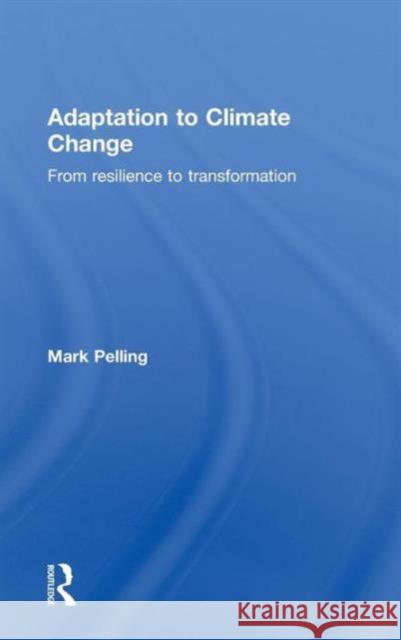Adaptation to Climate Change: From Resilience to Transformation » książka
Adaptation to Climate Change: From Resilience to Transformation
ISBN-13: 9780415477505 / Angielski / Twarda / 2010 / 224 str.
Adaptation to Climate Change: From Resilience to Transformation
ISBN-13: 9780415477505 / Angielski / Twarda / 2010 / 224 str.
(netto: 720,05 VAT: 5%)
Najniższa cena z 30 dni: 680,04
ok. 16-18 dni roboczych.
Darmowa dostawa!
The impacts of climate change are already being felt. Learning how to live with these impacts is a priority for human development. In this context, it is too easy to see adaptation as a narrowly defensive task - protecting core assets or functions from the risks of climate change. A more profound engagement, which sees climate change risks as a product and driver of social as well as natural systems, and their interaction, is called for. Adaptation to Climate Change argues that, without care, adaptive actions can deny the deeper political and cultural roots that call for significant change in social and political relations if human vulnerability to climate change associated risk is to be reduced. This book presents a framework for making sense of the range of choices facing humanity, structured around resilience (stability), transition (incremental social change and the exercising of existing rights) and transformation (new rights claims and changes in political regimes). The resilience-transition-transformation framework is supported by three detailed case study chapters. These also illustrate the diversity of contexts where adaption is unfolding, from organizations to urban governance and the national polity. This text is the first comprehensive analysis of the social dimensions to climate change adaptation. Clearly written in an engaging style, it provides detailed theoretical and empirical chapters and serves as an invaluable reference for undergraduate and postgraduate students interested in climate change, geography and development studies.
Climate change adaptation provides an opportunity for the restructuring of society. This is particularly true for those who are most at risk from the hazardous consequences of climate change â the economically poor, socially isolated or politically marginalized â where post-disaster reconstruction can be used to improve life chances and human security. But, we do not need to wait for catastrophic events before action to adapt can be taken â proactive adaptation can improve the quality of life for those at risk while simultaneously reducing risk and loss. Adaptation is too easily seen as a narrowly defensive task â protecting core assets or functions from climate risks. This book argues that adaptation is an opportunity to rejuvinate a progressive politics of development â reducing risk to build human capacity.
Reframing adaptation as a progressive act, while acknowledging the challenges to this agenda, requires a strong foundation in philosophy and a grounding in the political reality and life experiences of those at risk. The book has its roots in an egalitarian moral philosophy of development and interprets politics as the competition and collaboration of actors from the household to international organisations. Key contexts for the playing out of adaptation politics have so far been largely ignored by climate change community which has to date focussed primarily on natural resource users and the rural economy. In contrast this book focuses on urban contexts, tensions between national and local security and the ways in which organisations themselves can adapt to enhance development chances for people at risk.
A wealth of case study evidence is used to identify the principles upon which a progressive agenda for adaptation to climate change is already being built and might be accelerated through local, national and international policy. Two core messages resonate throughout the text. First that proactive adaptation greatly increases the success of post-event reactive adaptation. Second that development and humanitarian actors need to work much more closely together if we are to move from a defensive to a progressive engagement with climate change.











